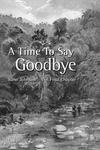
Title: A Time To Say Goodbye Rami Johnson - The Final Chapter
Author: C. Everard Palmer
Publisher: MacMillan Caribbean
Reviewer: Barbara Nelson
Silver Musgrave Meda list and renowned Jamaican author, C. Everard Palmer, has written yet another book, this one A Time To Say Goodbye Rami Johnson - The Final Chapter is the last in the Johnson family trilogy. It follows My Father Sun-Sun Johnson and Full Circle: The Rami Johnson Story.
A Time To Say Goodbye is heavy with nostalgia and the nuances of life in rural Jamaica.
Mrs. Donna Rae Johnson, Rami's wife, is the storyteller. She and Rami live at (the new) Robin Hill, a magnificent house that replaced the one that was destroyed by fire. Rami's father Sun-Sun died in that fire while trying to save his ex-wife and her new husband, his rival Jake Hibbertson
Rami, then a teenager, buried his father at River Bottom, his father's last parcel of land. He, however, decided to finish what his father had begun - making a return to prosperity and respectability in Kendal after he had been brought to shame and disgrace because of his dealings with Jake.
The story moves at a fast pace through 11 chapters. It tells how Cripes, an illiterate labourer who was once employed by Jake, becomes a strong ally to Rami. He helps the young man to establish his farm and Rami in turn helps him "to step out of the darkness of illiteracy into education's bright light."
When Rami goes to the university's Mona campus, he leaves Cripes, now a trusted headman and manager, in charge of his property.
Rami and his bride return to Kendal after studying in Kingston (she at Shortwood Teachers' College) and they take teaching jobs there - he in the high school and she in the elementary school.
Their lives unfold in the place where they are close to their in-laws, family and friends.
Palmer incorporates into his book delightful memories of "old time rural Jamaica" where people cared about and helped one another - Cripes, for example, is so grateful for his changed life that he asks Rami to help his friends - "Boss, they want you to learn them," he pleads.
Jealousy, however, creeps in. Alfred, an older labourer, "a good man with a machete", is outraged at "the yard boy" Cripes' elevation to headman. "A hurry-come-up, that's what you is," he fumes at Cripes. Alfred looks for a shortcut to improve himself and seeks help from an obeah man.
Instead of improving himself, however, Alfred becomes very ill after the visit to the obeah man. On hearing the dire warning of death given by "a shepherdess in the early morning hours when the patoo were flying" his condition becomes even worse.
Meanwhile Rami's wife has her first baby and her hands are full with her class of pupils. She enjoys teaching them and keeps an eye on Mendez, a precocious but kind-hearted student.
Palmer writes lovingly of the Jamaican countryside, its people and their peculiarities. At one point Rami's wife says she heard the croaking lizard hiding somewhere in the ceiling, probably readying itself to jump down on us, most likely on me.
In a last desperate effort to save Alfred's life, his wife decided to appeal to the dead ancestors for help. At the ettu, an African ritual staged by three elderly people, Palmer writes: "The rum put morning in their legs and volume in their chant. The trio sang in their language. It was truly a rural spectacle."
Another rural icon - the church bell tolling at his funeral the number of years that Alfred's had lived. And "while the coffin was being lowered, she (Alfred's wife) strew it with roses and the hardy, stringy yellow love weed, the accepted symbol of undying love."
However, just when the Johnson's thought they would never see or hear from Jake Hibbertsonagain, he returns to Kendal and later brings his twin brother Cory and Cory's son Eldorado with him. There's plenty of trouble ahead!
Everard Palmer, who worked as a journalist with the Gleaner Company, before becoming an author, has been living in Canada for the past 25 years.
In 2005, three of his books The Cloud with the Silver Lining, A Cow called Boy and My Father Sun-Sun Johnson were among the Favourite Ten Jamaican Fiction selected by readers in an initiative organised by the National Library of Jamaica to promote knowledge and reading of Jamaican fiction.

